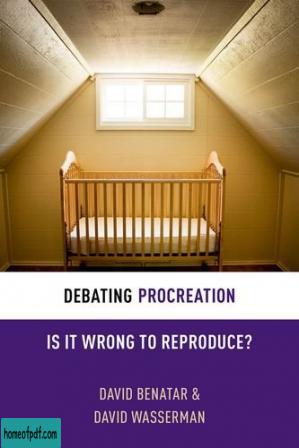Debating Procreation: Is It Wrong to Reproduce?
该资源由用户: 碧波含容 上传 举报不良内容

尊敬的读者:
欢迎您访问我们的网站。本站的初衷是为大家提供一个共享学习资料、交换知识的平台。每位用户都可以将文件上传至网盘并分享。
然而,随着用户上传的资料增多,我们发现部分不宜或版权问题的书籍被分享到了本站。
为此,我们已经关闭了分享入口,并进行了多次书籍审查,但仍有部分内容未能彻底审查到位。
在此,我们恳请广大读者与我们共同监督,如发现任何不宜内容,请 点击此处 进行举报,我们会第一时间处理并下架相关内容。
希望我们能共建一个文明社区!感谢您的理解与支持!
猜你喜欢

《气血才是命根子》张继传文字版
View more
《气血才是命根子》张继传文字版

Rediscovering JavaScript: Master ES6, ES7, and ES8 - Venkat Subramaniam
View more
Rediscovering JavaScript: Master ES6, ES7, and ES8 - Venkat Subramaniam

《与火同行:大卫·林奇谈电影》
View more
《与火同行:大卫·林奇谈电影》

Learning Python 4th Edition - Mark Lutz
View more
Learning Python 4th Edition - Mark Lutz

《大钱细思:优秀投资者如何思考和决断》乔尔·蒂林哈斯特珍藏版
View more
《大钱细思:优秀投资者如何思考和决断》乔尔·蒂林哈斯特珍藏版

《自驱型成长》威廉·斯蒂克斯鲁德(William Stixrud) / 奈德·约翰逊(Ned Johnson)
View more
《自驱型成长》威廉·斯蒂克斯鲁德(William Stixrud) / 奈德·约翰逊(Ned Johnson)

《图解金刚经:认识一部最伟大的佛经》珍藏版
View more
《图解金刚经:认识一部最伟大的佛经》珍藏版

《男人谈恋爱 谈的是什么》奔放的招财猫全彩扫描版
View more
《男人谈恋爱 谈的是什么》奔放的招财猫全彩扫描版

《学习究竟是什么》万维钢全新修订版
View more
《学习究竟是什么》万维钢全新修订版

《上帝的骰子 : 量子物理趣画》罗金海
View more
《上帝的骰子 : 量子物理趣画》罗金海

《焦虑星球笔记》[英]马特・海格文字版
View more
《焦虑星球笔记》[英]马特・海格文字版

《快乐的厨房时光:魔幻厨房+回家吃饭+烘焙工坊(套装共3册)》肖静珍藏版
View more
《快乐的厨房时光:魔幻厨房+回家吃饭+烘焙工坊(套装共3册)》肖静珍藏版



